Come for the tea, leave with a car. How Genesis is upping its luxury game

CHERRY HILL, N.J. — Genesis has the cars, the tech, the sales and pampering service. It has Genesis House, a stunning, wood-ceilinged sanctuary in Manhattan – near the High Line and Little Island Park – where visitors can enjoy everything from a cozy library and traditional Korean tea service, to an ambitious restaurant and cocktail bar helmed by chefs trained at the Michelin-starred Onjium in Seoul. (Genesis House itself is a Michelin Guide addition for 2023). If you’re suitably impressed by the abalone, snow crab and poached egg dish on a tasting menu, perhaps you’ll hit the showroom for a new car.
Only one menu item has been missing for this fast-rising luxury brand: A network of stand-alone showrooms to give customers the full luxury experience, as Genesis guns hard for Mercedes, BMW and other establishment brands.
On a media drive from New York to Philadelphia in the full trio of Genesis EVs – the GV60 hatchback/SUV, Electrified G80 sedan and Alabama-built Electrified GV70 SUV – we roll past a prime example of the brand’s brick-and-mortar handicap. The Genesis of Cherry Hill store, in the New Jersey suburbs just over the Delaware River from Philly, might have managed to sell 1,010 Genesis cars last year, but it did so side-by-side with a Hyundai store that sold 1,500 cars of its own. It’s the auto equivalent of a combination Pizza Hut and Ruth’s Chris, and it’s unfortunately been the norm. Literally underlining the point, the Genesis name and winged logo sits below Hyundai’s, squashed together on an outdoor showroom sign.
Just down the road is the swankier luxury model: The new standalone Genesis of Cherry Hill, where owner Peter Lanzavecchia is joined by family, colleagues and longtime charity partners – including broadcaster and former Philadelphia Eagles quarterback Ron “Jaws” Jaworski – for a ribbon-cutting ceremony. The Cherry Hill operation marks the ninth stand-alone Genesis store in America, for a luxury brand that has now sold more than 1 million cars around the world since it became a separate marque in 2015.
After a slow start in America, with a two-sedan lineup in a nation besotted with SUVs, Genesis is gaining serious momentum with acclaimed models like its top-selling GV70. September saw Genesis mark a pair of U.S. sales records, with 6,453 sales for its best-ever month, and a quarterly record of 19,427 sales. Those are still modest numbers versus luxury leaders such as BMW, which found nearly 88,000 buyers in the second quarter of 2023. But Genesis has now moved nearly as many cars in three months as did in all of 2020, when it posted about 21,000 sales. Even with auto sales recovering across-the-board, Genesis is outpacing all luxury rivals with a 24% jump in 2023, and is on pace for nearly 70,000 sales this year. Those numbers are led by its award-winning GV70, with nearly 18,000 sales through September. The Electrified GV70, the brand’s first American-made product, has found 959 buyers since it went on sale earlier this year in a select number of states.
An appearance in Cherry Hill by José Muñoz, the global president and COO of Hyundai Motor Company (and president and CEO of Hyundai and Genesis Motor North America), underscored the importance the brand is placing on a massive showroom expansion. Genesis now plans to have about 50 independent showrooms open by early next year, with another 100 in planning and development. In recent years – especially when a starting-from-scratch Genesis lineup was producing a trickle of sales – several combined Hyundai-Genesis dealers had been hesitant to embrace a corporate “Keystone” program that offered them financial incentives to invest in expensive upgrades for stand-alone facilities. The pandemic threw another monkey wrench into some of those plans. But Muñoz said the brand is determined to support dealers and convince them of the long-term benefits of opening Genesis-only stores.

“We will help a dealer feel total confidence that they will see good return on investment,” Muñoz said, adding “the idea that dealers will be going away” in favor of direct sales “is nonsense.”
For his part, Lanzavecchia agreed the Genesis name remains a mystery to many consumers, but that a nation full of stand-alone stores “will probably be a 10-x impact for brand awareness.”
Lanzavecchia claimed his combined Hyundai-Genesis operation already has Genesis outselling the local Mercedes dealer. Competing brands “know Genesis is on the map, and they hear the footsteps,” said Lanzavecchia, who recalled being among Acura’s first U.S. dealers decades ago. “We know we can beat the Japanese and Germans in the luxury game.”
Lanzavecchia and brand executives said top-flight customer service is a critical part of the strategy. Lanzavecchia said about 80% of his customers already use a valet service they cite as one of their favorite parts of ownership. The “Uber-like experience” brings a dealership driver (equipped with digital tablet) to a home or office to swap keys with a service customer. The driver drops a loaner car, and later returns a serviced and fully detailed car with a full tank of gas – or a topped-off battery for EVs.
Genesis spokesman Jarred Pellat said that everything from showrooms to Genesis House is driven by a philosophy of “Son-nim,” which means “honored guest” in Korean. The approach aims to maximize hospitality “at every touch point” for the brand, including fostering a serene, welcoming environment in the cars themselves.
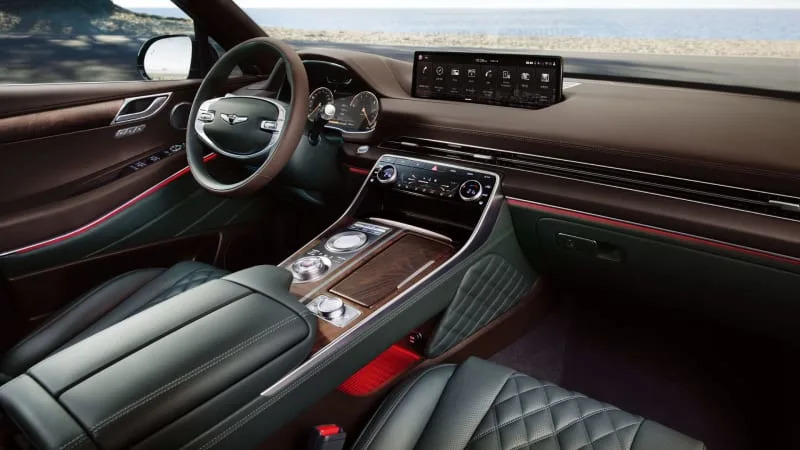
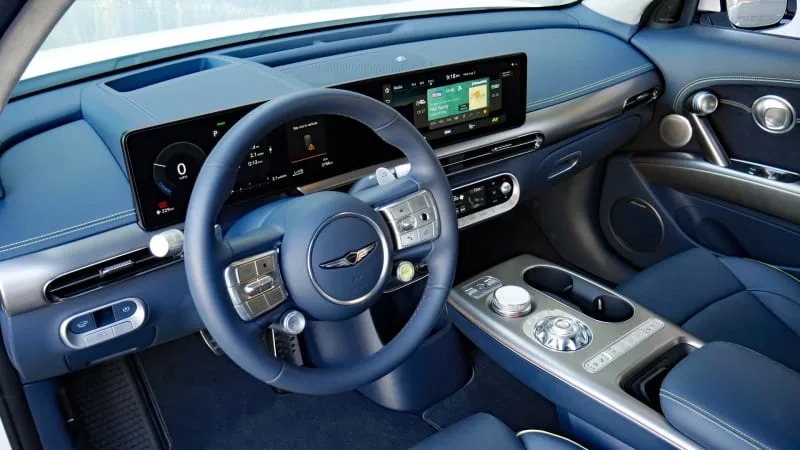
Those cars have helped Genesis usurp Audi especially – once a similar design-driven underdog – as the high-buzz brand that just seems hungrier than the competition. That philosophy is clearly reflected in the brand’s acclaimed exterior and interior designs. Don’t discount a notably generous selection of expressive, even adventurous colors and trims; from rich green or blue leathers to a stone-like “forged carbon” treatment on models such as the G80 Electrified. That simple-yet-conscious decision – to work from a richer, more-contemporary luxury palette – consistently eludes rivals that like to talk about being distinctive and different, but mostly hew straight down the middle.
Versus those luxury competitors, “We take chances and risks,” Pellat said. From top executive ranks down to design studios, the brand enjoys a clear brief to produce “audacious, progressive, distinctly Korean cars.”
The brand’s biggest risk, arguably, is one that Cadillac, Volvo, Jaguar and other brands are taking on as well. Genesis has vowed that every all-new model introduced in 2025 and beyond will be electric only, with no internal-combustion version. By 2030, Genesis intends to sell EVs exclusively, and to be a carbon-neutral brand by 2035.
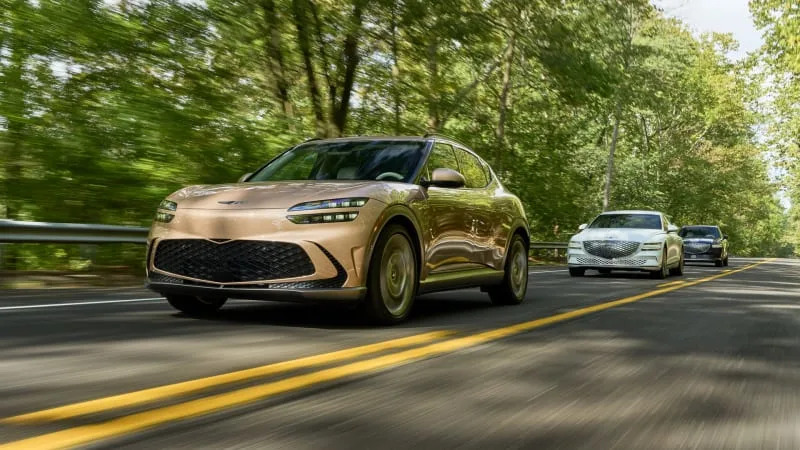
A full-day drive among the electrified GV60, GV70 and G80 once again shows the brand is off to a solid start. All three electric models are cloudlike and cosseting, suffused with quality, innovative tech and delightful features: The G60’s holographic console sphere, a kind of “Star Trek” snow globe, that flips 180 degrees on start-up to become a shift controller. The addictive Boost button on the GV60 and GV70 that serves up nitrous-like snorts of acceleration, leaving ICE cars quivering in their wake. Five selectable levels of regenerative braking, versus the one or two of most competitors. The sparkling emerald-green paint on a plug-in G80 sedan, or the buff-colored faux suede and diamond-quilted leather on the GV60.
As the only plug-in Genesis built on a standalone EV platform, the hatchback-styled GV60 is ironically the least compelling of the three. In one way, even that failing is a compliment: The GV60’s e-GMP platform mates, the Hyundai Ioniq 5 and Kia EV6, are such overachievers in design, performance, relative affordability and brisk 800-volt charging times, that there seems little reason to spend $60,000 and more for the Genesis version.
The gee-whiz tech keeps coming: A Digital Key with “Face Connect” lets users ditch a key fob entirely, flashing a smile (or not) to be recognized and enter the car, and a fingerprint for authentication and start-up. Smart Posture Care lets owners input their height and inseam, with the vehicle suggesting optimal driving position, or adjusting it during long drives to boost alertness and comfort. Smart Cruise Control adopts machine learning to replicate an individual’s driving style. A configurable brake mode brings a Sport setting for sharper EV brake pedal feel and more initial bite.
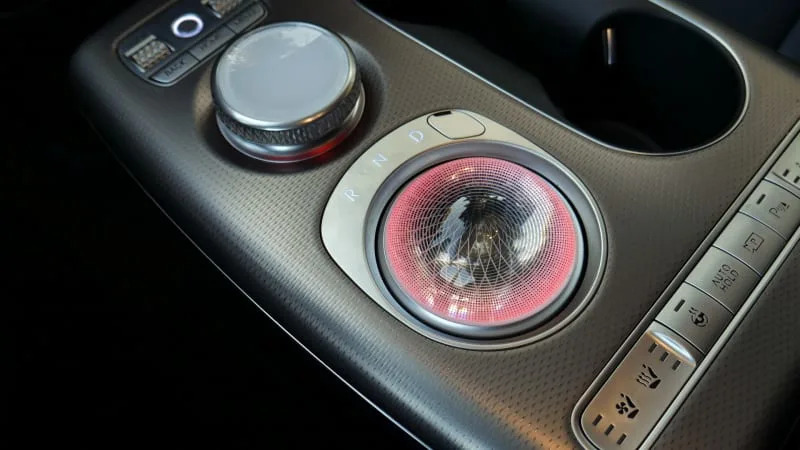
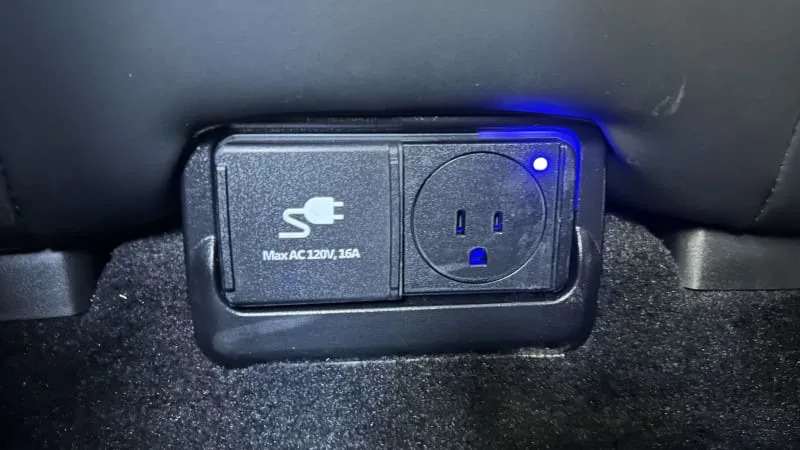
A well-tuned automated regen setting uses a front camera to adjust brake recuperation based on traffic ahead. Sophisticated active noise cancellation puts accelerometers in wheel wells to detect resonance and vibration, and applies predictive logic to keep it from penetrating the cabin. Vehicle to Load charging lets users power gear from an exterior port or interior outlet (pictured above).
Finally, an improved rear occupant alert adopts radar rather than ultrasonic sensors, which can detect, say, the movement of a baby’s chest even under a blanket or other fabric.
For all three models, so-so electric range is really the only performance demerit, and even that range is in line with electric models from Audi, Volvo, Mercedes, Cadillac and other non-Tesla luxury makes.
In New York, Genesis also found time for some big announcements: Its new EVs will adopt the Tesla NACS plug (for “North American Charging Standard) beginning in the fourth-quarter of 2024. Existing EV owners with CCS plugs will gain Tesla Supercharger access in early 2025 by means of adapters. And where the brand, 18 months ago, offered its initial GV60 EV only in California and the New York tri-state area, it will now sell its three EV models in 33 states. The latest expansion immediately adds 10 states to the EV sales network, including Michigan, Ohio, New Hampshire, Kentucky, Tennessee and Mississippi. Genesis (with Hyundai and Kia) has also joined a new consortium of seven of the world’s largest automakers that intends to build 30,000 DC fast charger stations in the United States and Canada, equipped with both CCS and NACS connectors.
Finally, a new Genesis Home service sends consultants to a home or business to guide customers in their clean-energy choices; not just for setting up EV chargers, but also home energy storage or solar additions. Considering Genesis’ stellar lineup, growing sales and ambitious expansion plans, the forecast points to sunny days ahead.
Related video:







